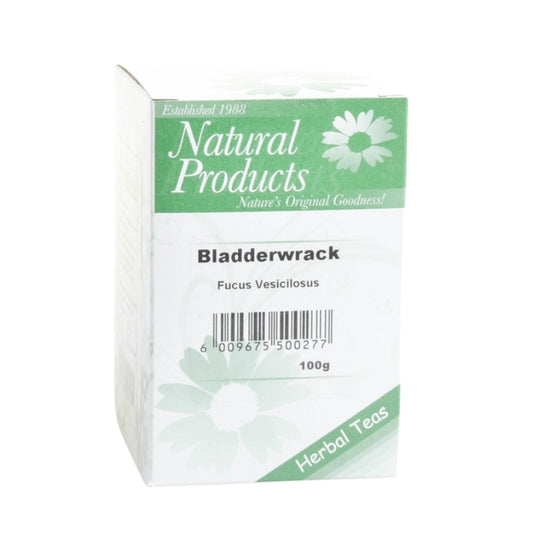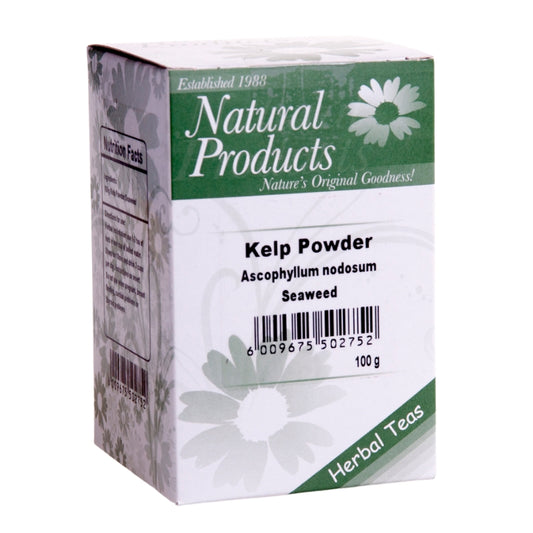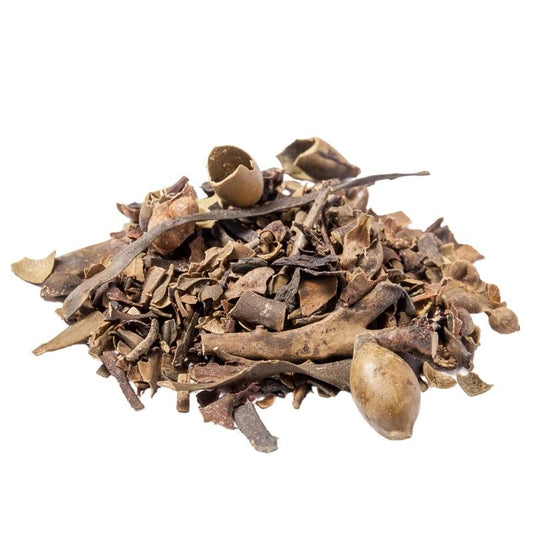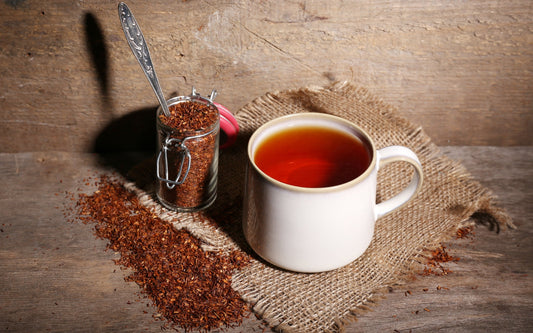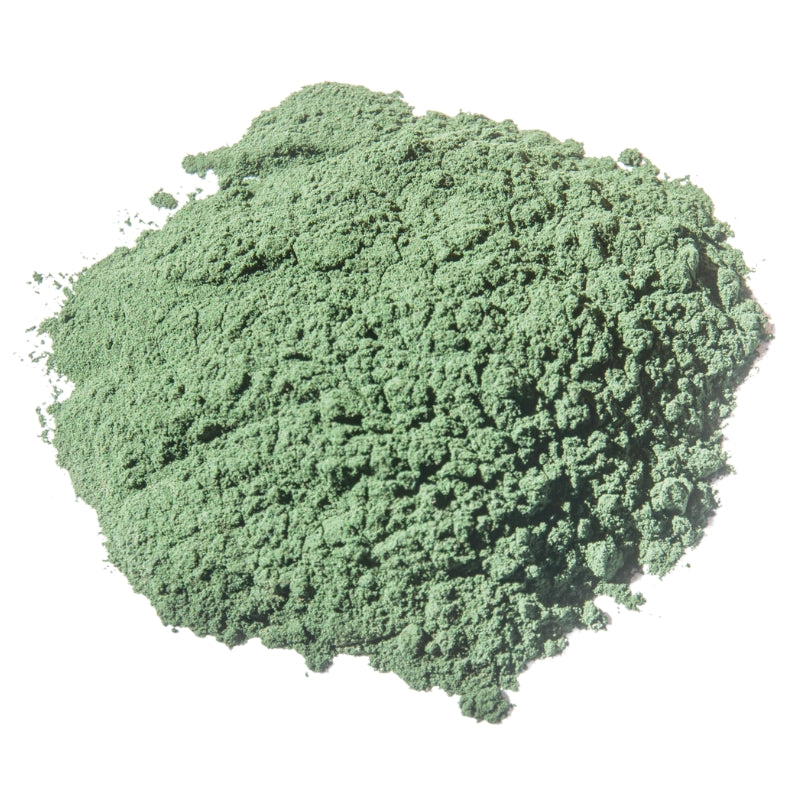
Is Spirulina As Great On The Skin As It Is Within?
Aiden van WykSpirulina has been widely used and adored throughout history; from its use as a protein packed staple by the ancient Aztecs, to its recent inclusion as one of the botanicals approved for cultivation in space by NASA. And of course, in the wellness sphere Spirulina has earned much respect as a supplement due to its fantastic nutritional and mineral content.
But can Spirulina's powerful benefits be harnessed for your skin, too?
Find out whether this Superfood will cause a Big, Blue-Green Skincare Revolution on your shelf today!
What is Spirulina?
Spirulina is a blue-green algae that grows in both fresh and salt water. It's high in essential nutrients like thiamine, riboflavin, niacin, folate, beta-carotene, and vitamins C, B6, E, and K. It's also rich in minerals like iron, copper, magnesium, calcium, phosphorus, potassium, and manganese.
These components are all beneficial for skin health in their own right. But what truly sets Spirulina apart are two compounds: Phycocyanin and Zeaxanthin.
What does Phycocyanin do in Skincare?
Phycocyanin is the pigment responsible for Spirulina's vibrant blue-green colour. It's powerful at countering oxidation.
Skincare benefits of Phycocyanin include:
- Protecting the skin against oxidative stress, which helps reduce premature ageing, fine lines, and environmental damage.
- Soothing irritated or inflamed skin - especially beneficial for conditions like rosacea.
- Promoting wound healing and skin regeneration.
- Supporting a healthier, more radiant complexion.
What does Zeaxanthin do in Skincare?
Zeaxanthin is typically a carotenoid extracted from marigold petals. It's an oil-soluble antioxidant with particularly beneficial protective properties.
Skincare benefits of Zeaxanthin include:
- Absorbing harmful blue light and UV rays, helping prevent photoaging - so if you spend a lot of time in front of screens, this might be the extract for you.
- Improving skin hydration, supporting the lipid barrier, and enhancing firmness.
- Reducing texture and smoothing the skin by limiting oxidative stress.
- Brightening the complexion and evening out skin tone, including dark spots and fine lines.
The health benefits of Spirulina
While, we are focusing on topical skincare for this piece, we would be neglecting a major opportunity if we did not mention why Spirulina has gained the status as one of the greatest, most nutrient dense Superfoods of all time.
Some of its internal benefits include:
- Cardiovascular Health: Lowers bad cholesterol (LDL), raises good cholesterol (HDL), reduces blood pressure, and supports heart health.
- Stabilizes Blood Sugar: Shown to reduce fasting blood glucose levels.
- Potent Antioxidant & Anti-inflammatory: Reduces oxidative stress and chronic inflammation, increases energy, and may reduce allergic responses.
- Detoxifying Effects: Assists in removing heavy metals, supports liver function, and helps manage Candida overgrowth.
- Immune Support: Boosts white blood cell count and antibody production, enhancing your ability to fight off illness.
- Workout Recovery: Improves oxygen uptake, reducing exercise-induced muscle damage and inflammation and speeding up recovery time.
- Weight Management: High in protein, which helps suppress appetite and reduce BMI.
- Additional Benefits (Still Under Study): Potential support for eye and oral health, brain protection (including Parkinson's and Alzheimer's), anticancer activity, and the management of anaemia.
If you do intend on supplementing Spirulina, general daily doses are 3 - 8 grams with a max of 10 grams daily for up to 6 months. Start with a lower dose and gradually increase.
And a quick final tip would be to avoid making Spirulina tea - heat can degrade its active compounds. For best results: Add it to smoothies or take it in capsule form.
Why put Spirulina directly on your skin?
When you eat well, your skin often reflects that.
But in some cases, applying ingredients directly to the skin is more effective than taking them internally as it allows the active compounds to go straight to where they're needed in a higher concentration, instead of it being spread throughout your body.
Take Niacinamide as an example. While some people consume it as a brightening supplement, it's often far more effective when applied topically, where it can directly support skin tone, nourish the skin barrier and elasticity.
How to best use Spirulina in skincare
Spirulinas components are outstanding in skincare. The problem is that extracting it is tough. This is because the beneficial components are only extractable in either water or oil, not both.
Below we'll go through the best ways to use and extract spirulina dependent on your goal.
Spirulina as a face mask:
Using whole Spirulina powder in a face mask delivers a mix of amino acids, vitamins, and minerals. This will be detoxifying and leave the skin feeling refreshed. However, because the cell walls of the Spirulina are still mostly closed, the actives aren't very bioavailable - meaning they won't penetrate deeply into the skin. A way to break the cell walls is to soak it in alcohol first, but more on that later.
Spirulina face masks help with:
- Surface - level nourishment
- A gentle detox
Spirulina as a Water Extract
Spirulina is heat sensitive, so don't heat it up. A cold-water extract will pull out the water-soluble components, including the Phycocyanin, minerals, peptides and polysaccharides. This form is great for incorporating into toners, creams, gels, and serums.
Spirulina water extracts help with:
- Redness, sensitivity, and inflammation
- Hydration and barrier support
- Post-sun or post-exfoliation soothing
- Antioxidant and anti-ageing effects
Spirulina as an Alcohol Extract
Alcohol extraction pulls out the Zeaxanthin, carotenoids, some B vitamins, chlorophyll, and flavonoids. However, alcohol denatures proteins like Phycocyanin and doesn't extract minerals. This extract can be added to antioxidant mists, toners, roll-ons, and creams.
Spirulina alcohol extract is helpful for:
- Blue light defence
- Pollution protection
- Mild antimicrobial action (helpful for clogged pores)
- Skin brightening and tone evening
Spirulina as an Oil Maceration
Oil macerations extract Zeaxanthin, carotenoids, and chlorophyll, but again, the cell walls limit the potency. To boost extraction concentration, Spirulina is often first soaked in alcohol to break down the cell walls, then infused into oil. What you'll then gets is a rich green oil packed with antioxidants and brightening compounds.
Spirulina Oil Macerations are great for:
- Barrier repair and dry skin support
- Daily facial oils for antioxidant protection
- Defence against blue light and environmental stressors
Spirulina as a Glycerite
Spirulina glycerites are an interesting exception, as they can pull both oil- and water-soluble compounds. The trade-off is that extraction is slow (at least 6-8 weeks), often inefficient without additional preparation and nevertheless not as concentrated as water or oil extracts. Pre-soaking in alcohol may help but note that alcohol can denature sensitive proteins like Phycocyanin.
The result is a nutrient-rich extract ideal for general skincare use, but it may not deliver concentrated levels of actives unless carefully prepared.
- Adding gentle nourishment.
- Boosting hydration with antioxidant benefits.
Is Spirulina safe?
Yes - generally.
Spirulina is widely recognized as safe and well-tolerated in most topical and internal uses. However, if you're considering it as a supplement, we strongly recommend consulting your healthcare provider first, especially if you fall into one of the following groups:
- Pregnant or breastfeeding women
- Children
- Individuals with autoimmune or immune-compromised conditions
- People with bleeding disorders (as Spirulina may increase bleeding)
- Diabetics (may affect blood sugar levels)
- Those with shellfish allergies (possible cross-reactivity)
Formulating with Spirulina
What is the solubility of Spirulina?
As mentioned above, Spirulina does not really dissolve but it can be extracted into either water or oil base, depending on which actives you want to access. The solubility of the resulting extract depends on the medium used.
Reminder: All Spirulina extracts are heat sensitive - keep temperatures below 40°C during formulation.
What is the pH of Spirulina?
The pH will depend on the medium it's extracted into. Pure Spirulina naturally grows and thrives in highly alkaline environments (pH between 8.5-10.5), but for skincare formulations, the extract works best in the 4-6 range.
What is the recommended usage or concentration for Spirulina?
Spirulina can be used at higher percentages depending on your formulation type and the extraction base (sometimes even up to 100%).
For example, in Glycerine or Alcohol extracts, 100% may be too heavy and can impact the texture or feel of the formula. Water or Oil extracts can generally be used at higher concentrations, though we always advise patch testing with new ingredients at higher concentrations.
In most cases, 5 -10% is more than enough to deliver its beneficial actives without overpowering the product.
What pairs well with Spirulina?
How you pair Spirulina with other ingredients depends on the form of the extract you're using. Here are some universal pairings with Spirulina:
- Aloe Vera - Calming and hydrating
- Panthenol - Soothes and supports the skin barrier
- Glycerine - Draws moisture in and boosts hydration
- Allantoin - Gentle, calming, and softens dead skin buildup
- Niacinamide - Brightening, barrier-boosting, and oil-regulating
- Green Tea - Enhances antioxidant profile and photoprotection
- Liquorice Root - Brightens and soothes sensitive or reactive skin
- Gotu Kola - Supports skin repair and reduces irritation
Alcohol-Based Extracts (use up to 5%):
- Ginkgo Biloba - Circulation and antioxidant support
- Calendula - Reduces redness and inflammation
- Caffeine - Brightens, energises, and boosts circulation
- Witch Hazel - Astringent and refreshing
- Rosemary Essential Oil - Antioxidant-rich, antimicrobial, and helps stabilise formulas
Oil-Based Macerations (for balms, serums, or oil cleansers):
- Rosehip Oil - Regenerative and brightening
- Sea Buckthorn Berry - High in carotenoids and omega fatty acids
- Jojoba Oil - Skin-mimicking and helps stabilise the oil blend
- Pumpkin Seed Oil - Supports barrier repair and blue light protection
- Squalane - Lightweight and great for dry or sensitive skin
- Vitamin E - Antioxidant and helps stabilise pigments and oils
- Bakuchiol - Pairs beautifully with Spirulina for a plant-retinol-like synergy
Face Masks (Powder):
- Clays (Kaolin, Bentonite, French Green, etc.) - Detoxifying and oil-controlling
- Activated Charcoal - Deep cleansing and clarifying
- Honey - Gently exfoliating, hydrating, and antimicrobial
- Lactic Acid - Brightening, mild exfoliation, and skin-smoothing





